The simplest way to Hide Files and Folders on a Windows 10/11 computer is to open File Properties and designate the selected File as being “Hidden” in Attributes section of File Properties.
This method of Hiding Files and Folders should be good enough for Family Computers where the intention is to prevent kids or anyone else in the family from accidentally deleting or modifying important files and folders.
Another method of Hiding Files and Folders on a Windows computer is by making the computer to treat your important Files and Folders as System Files, which it automatically hides.
The second method requires the use of command prompt to hide/unhide files, which makes it difficult for anyone with average computer skills to snoop on your files.
Hide Files and Folders in Windows 10/11
In case of a common home computer, there is always the possibility of important Files or Folders being accidentally modified or deleted by kids or someone else in the family.
An easy way to prevent this from happening is by hiding important files and folders on your computer by using different methods as provided below in this guide.
1. Hide Single File/Folder on Windows computer
As mentioned above, the easiest way to hide a single file or folder on a Windows computer is by going to the File Properties screen.
1. Right-click on the File/Folder that you want to hide and select Properties in the menu that appears.
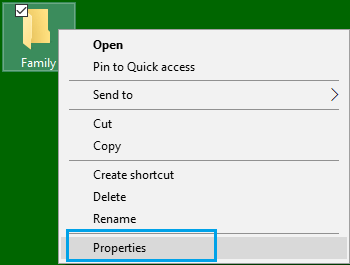
2. On File Properties screen, scroll down to the “Attributes” section and check the little box next to Hidden and click on Apply.
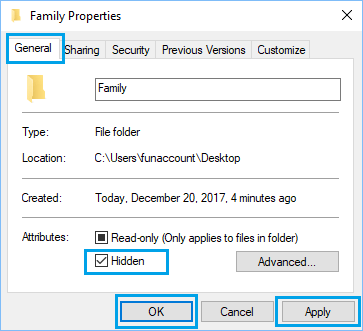
3. On the pop-up, select whether you want to hide the selected Folder only or Apply Changes to Folder, Subfolders and Files.
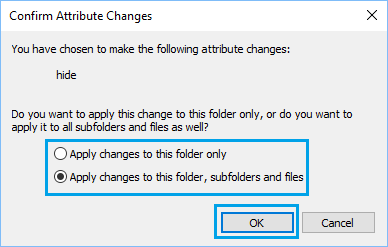
4. Click on OK to save this change on your computer.
Depending on the selection, the selected Folder or Folder along with all its Subfolders and Files will become hidden.
2. Hide Multiple Files/Folders on Windows Computer
Follow the steps below to Hide Multiple Files and Folders on your Windows 10/11 computer.
1. Open the File Explorer on your computer.
2. On File Explorer screen, select the Files/Folders that you want to hide, click on the View Tab in the File Explorer top menu bar and then click on Hide selected items option.
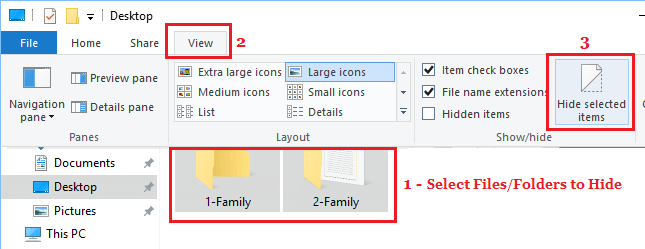
3. On the “Confirm Attribute Changes” pop-up, select the hide option that suits your requirements.

4. Click on OK to Save or Apply the changes made.
3. Unhide Files/Folders in Windows 11/10
When Files and Folders are hidden on a Windows computer, they no longer appear in File Explorer. However, you can easily Unhide Files and Folders that you had previously hidden by following the steps below.
1. Open the File Explorer on your computer.
2. In the File Explorer Window, click on the View tab and then check the ‘Hidden items’ option in Show/hide toolbox.
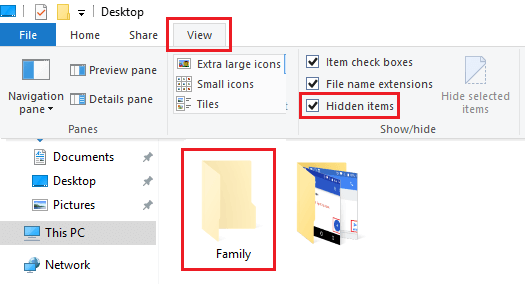
Checking the Hidden Items option will reveal the Hidden Files/Folders in that location.
After this, you should see hidden Files/Folders appearing on the screen with partially transparent icons, which allows you to distinguish Hidden Files from regular ones.
4. Hide Files/Folders Using Command Prompt
The methods to Hide Files and Folders in Windows as described above are only good for Home or Family Computers, where no one is really trying to snoop on your files.
In order to truly Hide Files and Folders in Windows 11/10, you can either make use of various Third Party Tools as available in the market or make use of a workaround.
The workaround as provided below involves making the Windows computer treat selected Files/Folders as System Files. Once this is done, Windows operating system will Automatically hide those files, just as it hides other System Files.
1. Type Command in the search box, right-click on Command Prompt Admin and select Run as administrator option.
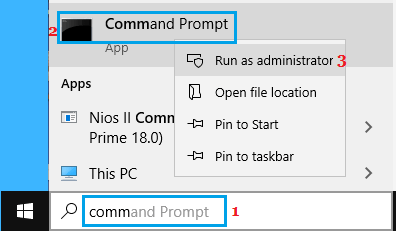
2. In the command prompt window, type attrib +h +s followed by The File Path and press the enter key.

In above case, File named as “Family” is located on the desktop and its File Path can be written as C:\users\funaccount\desktop\family.
The letters “h” and “s” in the attribute command instruct the computer to treat the selected File/Folder as Hidden and as a System File.
3. Once the command is executed, the File/Folder named in the “Attrib” Command will be treated as a System File by your computer and it will become hidden.
Important: Make sure that you note down the file path for the hidden files, you will need this to unhide the file.
5. Unhide Files/Folders Using Command Prompt
You can make the Hidden Files visible again by replacing “+” sign with “-” in the “attrib” command and running it again on your computer.
1. Open Command Prompt with Admin rights.
2. In the command prompt window, type attrib -s -h C:\Users\funaccount\Desktop\Family and hit the Enter Key on the keyboard of your computer.
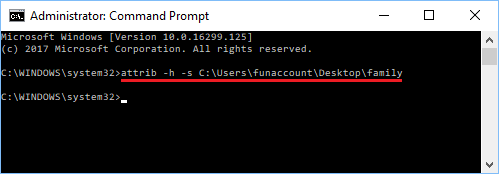
Once the command is executed, you will see the hidden Files/Folders appearing back on your computer.